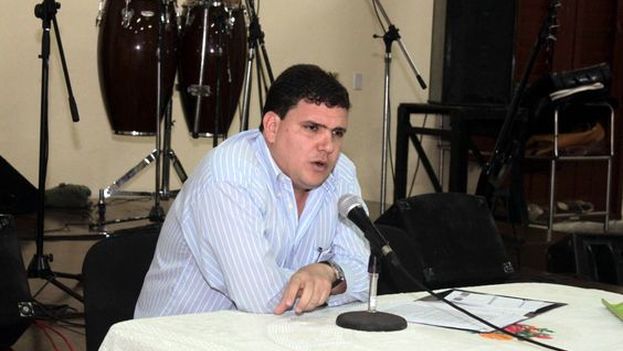
![]() 14ymedio, Mario Penton, Miami, 26 October 2016 — “It’s not because you write in OnCuba, it is what you write,” were the words used by the authorities of the Faculty of Law of the University of Havana to tell Juan Antonio Fernández Estrada that he could not continue to be a university professor. This measure “put the lid on the jar” and provoked a reaction from the teacher, who says he will not stay silent about this new outrage.
14ymedio, Mario Penton, Miami, 26 October 2016 — “It’s not because you write in OnCuba, it is what you write,” were the words used by the authorities of the Faculty of Law of the University of Havana to tell Juan Antonio Fernández Estrada that he could not continue to be a university professor. This measure “put the lid on the jar” and provoked a reaction from the teacher, who says he will not stay silent about this new outrage.
“I do not want to make a media show of this. I am submitting demands through the relevant channels and waiting for the responses to a situation that I consider unjust,” Fernandez told 14ymedio by phone, after an email he shared with friends explaining his situation went viral on the national servers. He further clarified that had never asked anyone to share or make public that communication which was meant to be private.
As of March 2012, the professor has contributed articles to the American magazine OnCuba, a publication with correspondents in Cuba that is widely disseminated through informal networks on the island.
The magazine is permitted by the Government and is a refuge for journalists and academics who see their contributions as a way to increase their meager income working in the state sector. Fernandez has published twenty columns ranging from opinions, history, politics and other topics of interest to Cubans.
“They informed me that my contract as a guest lecturer at the Faculty of Law could not be continued because I had been asked to resign from the Center for the Study of Public Administration (CEAP), and having done so, I had resigned from all of the University of Havana. I told them that other teachers had continued on as guest lecturers after having resigned as professors, but they explained to me that my resignation from CEAP had been for personal problems, the University considered it was because of my writings for OnCuba, and especially for an article about President Obama’s visit to Cuba,” reads an email that Fernandez sent to his friends.
The article referenced said, “I don’t want to know anything about the Industriales (baseball team) or Obama,” published at the beginning of April of this year, after the visit of the US president to Cuba. In this opinion column, Fernandez lambasted “the cries that warn us of Obama’s deception” and, putting his finger on the wound, wrote, “We, the people, we are not the one approaching the United States, nor like sovereigns did we talk in secret for more than a year with that government, nor did we invite President Obama to Cuba, nor did we invite him to speak live on national television.”
Given the impossibility of being hired, the professor told them that teaching was his only work, but the officials, undaunted, spit out that “you should have thought of that before writing those things.”
“I am telling you this because my silence is over this time,” said Fernandez in his email. “The University has not respected my silence all these years. I didn’t complain in 2008, I didn’t complain in 2012, but this time they can’t eliminate me without my speaking and responding.
The pressures of the Cuban authorities so that journalists and academics don’t collaborate with the private press and the emerging digital platforms has intensified over the last year. Presenters on radio and television were told in a circular transmitted verbally that they were prohibited from cooperating with these other media. According to a witness to some of the meetings, they were reminded “within the Revolution, everything, but outside of the Revolution, nothing,” which motivated everything from letters of protests to continued desertions to the independent press.
“The confusion of some has been to think that all my problems at the University of Havana have been because of errors,” concluded Fernandez, “because of naiveté, but it’s not like that, my problems have been for telling the truth, for being dignified and honest, for defending socialism and criticizing the opportunists and the shameless. These are my crimes and I will continue committing them.”
